#hawks meta
Text
Hawks and Twice; Identities and Foils
Part one, lol
Okay, season six is fully out so I can finally talk about the Hawks killing Twice scene without tagging it as spoilers because. Listen. I love you guys, but some of the takes I’ve been reading about it are just maybe not the scalding hot read you think they are. So... let’s talk about it.
There are a few things that most people have picked up on and that I’d like to reestablish so we can all move past them to the nitty-gritty stuff. First is that, yes, Hawks is in the wrong for killing Twice. Narratively, it is considered by everyone (including Hawks himself) to have been a bad thing to do. There’s so much grief surrounding Twice’s death, and everyone involved is badly affected by it. That’s the point of the scene. You aren’t supposed to have the takeaway that this was a righteous act, or that it was fair; it’s supposed to feel brutal, and wrong, and disgusting. You are supposed to come away questioning a lot of preestablished “truths” of the series. The main one here, of course, being that the roles of Heroes and Villains may not be as clear-cut as previously shown.
HOWEVER. The continuing takeaway is not really meant to be that Hawks is evil, or that the villains were actually in the right all along. Sure, you can personally dislike Hawks and/or his actions, but narratively speaking, this scene is not supposed to reframe him as somehow worse than the actual villains. What this scene is mean to accomplish is a deconstruction of the concept of heroes, villains, and the ties that bind them to better understand their similarities as much as their differences.
Identity is a prominent theme throughout the story, and the way Horikoshi plays with both the concept of identity and roles in this scene is really interesting and very well done.
To start with the easier stuff, the first two “identities” that are immediately flipped on their heads are the titles of Hero and Villain. Both within the story and as an audience with our own external culture, we can recognize that Heroes are supposed to be 'good' and Villains are supposed to be 'bad'. That's a presupposed fact, and it's not hard to see that, while this has usually been true in the context of the story, suddenly it's not so clear—how can someone be a Hero when they're acting the way Hawks does? How can that be ordered by the people in charge of the Heroes? Sanctioned? Approved of?
The obvious answer that I'm sure you're telling me to get to already is that the heroes aren't always 'good', and that Hero society is, in fact, worse.
The art emphasizes this beautifully (seriously, the art in this scene is so good); Hawks the Hero stands shadowed and coldly predatory, while Twice the Villain is on his back, belly-up on the ground, trembling and crying. Hawks mocks Twice for being too trusting, Twice tells him that he had to be, because it was kind. And he can’t imagine not being that.


And this polarity reveals why it is so important that these two, who superficially have very little in common, undermine the dichotomy between Hero and Villain. Because Hawks and Twice actually have one very specific trait that connects them: the desire to help people.
Now, they obviously show it very differently and have opposing definitions on who, exactly, they believe deserves help. That’s what makes them foils. But the gut-wrenching string between these two men is that they are both trying to protect people. That’s their underlying goal, the one fundamental principle they both have that they will not waver on; unstoppable force, meet immovable object. They are, for this one moment, the same person. Because it’s also not as simple as just their desire to protect people—it’s that they both were inevitably going to end up in this stand-off.

Something I don’t see talked about very much is how both Hawks and Twice are being used. It’s pretty obvious with Hawks, having been essentially bought as a child and manipulated by the HPSC to become the perfect hero and do what’s asked of him on the basis that, again, he wants to help people. He was a kid who was so alone and so desperate to be good, and then the HPSC, seeing how much potential he had, swooped in and offered him the resources and ability to make his dreams come true. He is a good person whose trust and sense of compassion have been manipulated so that he commits reprehensible acts because he is both told and genuinely believes that they will save people’s lives. And the really fucked up part is that they’re right— but more on that later.

For the people saying— “but that’s not like Twice at all. Twice is working with the League. They’re his friends. He loves them”—yeah that’s my whole point. What is the one thing Twice desperately wants, more than anything? Companionship. The feeling that he isn’t alone. Love. He’s been by himself almost his whole life, and his every choice has been reflective of his desire to have meaningful connections. He wants to be surrounded by people who accept him, and he wants to accept them in turn. and the League take advantage of that.
Now, before anybody gets mad, yes, the League do actually care about each other. Their relationships are complicated to say the least, and not really the found family that I see cropping up sometimes in Fanon, but they have each other’s backs, and they take care of each other. They don’t mind Twice’s eccentricities, and in fact even praise him for them.
Which is sort of the problem. On his own, Twice is, at best, an unstable man willing to steal and ignore a lot of societal rules for the sake of his own comfort and happiness. But he isn’t naturally violent. In fact, the first time he experiences real, visceral violence, it traumatizes him so badly he gains an entire dissociative disorder.
But that’s okay! He doesn’t mind that so much, as long as he has friends. He just wants to be helpful. And oh boy, does the League want his help.
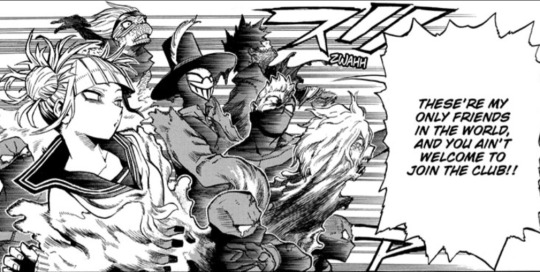
For people who do (in my opinion) genuinely care about Twice, they also ask him to do a lot of fucked up stuff (like kidnapping, and murder, and other general terrorist stuff). Because it benefits them. What other organization does that, I wonder?
Oh. Right.
Twice is dangerous. I’m sorry to all the people that like to infantilize him and act like he wasn’t about to run out of the door and murder and/or severely injure a bunch of heroes/civilians, but Twice was, canonically, going to go do that. Because he believed that that was the only way to save his friends. That’s part of why this scene is so horrific and well written, because either way it went, someone was going to lose. And the unfortunate reality is that if Hawks didn’t stop him, Twice was going to go commit some unforgiveable crimes to a lot of people who didn’t deserve it, and he was never going to go quietly, because that’s not the kind of person that he is. Which Hawks understands; he’s the same way. But it’s also awful because neither of them should have ever been put in the position to have to make this choice.
A big part of what the story explores when it comes to identities is how they are defined, and who gives them to you. Hawks and Twice both actively struggle with this, being two people who don't feel (rightly or not) that they've had a lot of agency in their lives.
Hawks wants to help people, but he feels stifled by the role of Hero, which was chosen for him, and whose expectations he chafes against. For as much as he supports the HPSC and upholds their goals, he has a lot of doubts and critiques of how hero society works. He is a Hero because somebody else saw him and thought he should be, not necessarily because he decided to be all on his own, regardless of his own twisted view of his past. But he doesn't always like what is asked of him, or the restraints that working for the HPSC puts on him. It's heavily implied that he feels like his personhood has been lost to his Hero identity (Hawks, as opposed to Keigo), and doesn't know how to reconcile his own actions with the public's perception of him.
Twice, similarly, had his role chosen for him at a young age (hitting a guy with his motorcycle and spiraling afterwards) and actively dislikes the label of Villain. He's not someone who craves violence or cruelty, but rather someone who gravitates towards it because he's run out of other options. And if the only people who are kind to him are Villains, what does that say about Heroes and their so-called goodness? Twice doesn't know that he, or any of the League, should be called Villains. How can they be worse than the heroes when basic decency is too much to ask of the people you're meant to idolize?
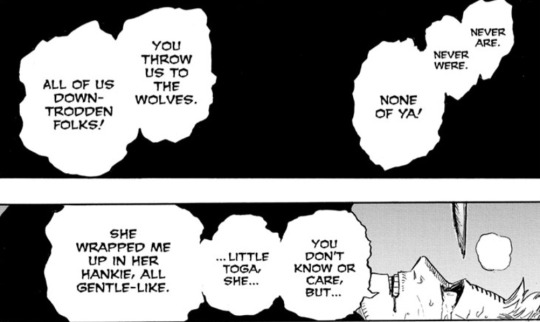
They're both caged by the way the world sees them versus the way they want to be seen, as well as trapped by the choices they've made in relation to the people they wish they were. Because, to be clear, they do both make choices. That's how they end up where they do, both wishing they were somewhere else—or maybe someone else.
Twice is a killer who never set out to be a killer. Hawks is a killer who never set out to be a killer. Twice is a Villain. Hawks is a Hero.
They’re in a room alone together. Outside are all the people they want to protect. Someone has to blink first.
In this moment, they are the same.
#bnha#bnha meta#hawks#twice#hawks meta#twice meta#next up even more of me being pedantic and overanalyzing everything
53 notes
·
View notes
Text
I want to write an actual fic but I have no idea where to start 😐😃
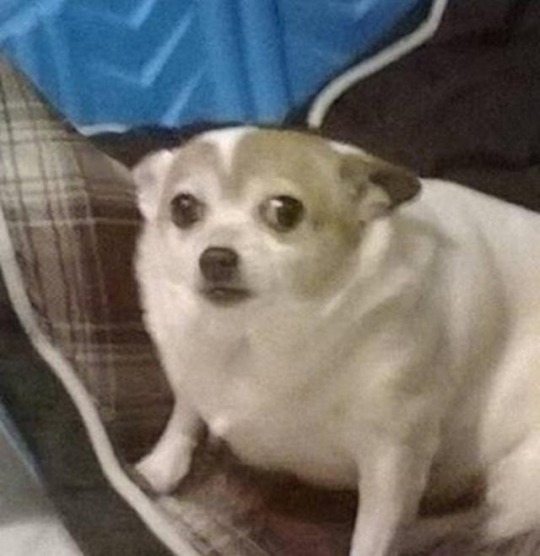
#midoriya x y/n#villian!deku#villain deku x reader#class 1-a x reader#deku x y/n#bnha oc#bakugo thoughts#domain.bnha#hawks meta#my hero academia#bnha smut#bnha au#bnha#my hero acedamia#mha#izuku mydoria#midoriya#bnha bakugou#bnha shoto#bakugou imagine#bakugou x reader#bakugou katuski x reader#shoto x reader#todoroki shoto#shoto todoroki#midoriya izuku
96 notes
·
View notes
Text
It’s ironic how Hawks losing his wings would in many ways grant him the freedom he’s always sought out; the freedom of normality
#honestly? good for him#let him move to a nice little apartment with lots of plants and maybe a cat and a lot of sunlight#let him have a job that lets him set normal boundries a#and let him have friends#and his Dabi#Hawks#keigo takami#mha#mha meta#hawks meta#bnha
30 notes
·
View notes
Note
Are there any asexual superheroes?


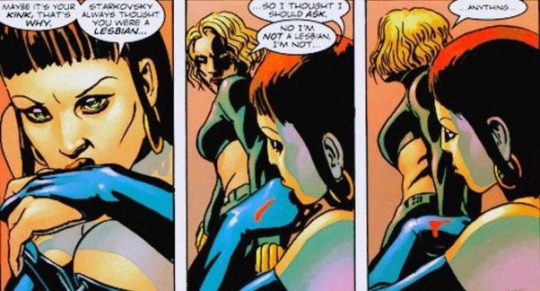

589 notes
·
View notes
Text
I'm playing through Dragon Age 2 again and I just can't get over how... idk how to say it exactly, but the way you feel, in every moment of this game, how much Varric loves Hawke. It feels entwined with everything, it breathes through every part of the narrative, it blooms diegetigally through the integration of story and gameplay, makes you a co-conspirator in that love in a way maybe only a video game could.
It's in the way I don't think this story is a defense of Hawke only -- or even primarily -- directed at Cassandra, but at Hawke themselves. Beneath everything else going on there's the quiet, utterly unshakable refutation of Hawke's worst fears: Did you think you mattered, Hawke? Did you think anything you ever did mattered? . . . You're a failure, and your family died knowing it. Rising through the story as Varric tells it there's a fiercely tender voice saying: Yes, you did matter. In tragedy or in triumph, for better or for worse, in love or in hate, you always mattered. The ultimate tragedy of Hawke is always right there in the open before the story even starts letting you in on telling it; they couldn't fix anything. They couldn't stop the downward spiral Kirkwall was set on -- the real truth is that no one person ever could. And yet the point of DA2 is that it matters that they tried, and it matters that there were people who loved and were loved along the way, however badly it all failed in the end. Hawke is the Bioware protagonist who succeeds the least, and they're the character who matters the most, to me. (This is also why the Absolution reveal did not shake me in the least haha, my love for Hawke has nothing at all to do with whether they succeeded or failed at anything.)
What Varric is saying, in the only way he seems to be able to say the really real things -- through stories -- is so simple and so fundamental. You were here, and I loved you. There's the emotional heart of it, at the end of it all, that love and grief and recognition. It's so dizzyingly intimate. There's so much distancing, layers upon layers of obfuscation, to be able to say it. It drives me insane!!!! It makes me feel the same way that 'Poem' by Langston Hughes does:
I loved my friend.
He went away from me.
There's nothing more to say.
The poem ends,
Soft as it began,—
I loved my friend.
He loved his friend. They went away from him. What more is there to say. (Many, many, many things, when you're a compulsive liar and storyteller, but hey sometimes you have to deploy a whole armada of lies to tell one simple truth, I understand, I'm a writer too lol)
#dragon age#varric tethras#dragon age 2#dragon age meta#hawke#on second thought let's not go to kirkwall; it is a silly place#when merrill says she just says 'I love Hawke' to herself because it's the only thing in the world that makes sense sometimes...#varric clearly Felt That lol#how can I have played this game so many times and still have such intense feelings about this. help. the unreliable narrator got to me ok#dragon age absolution spoilers#it's real vague but let's be safe. anyway meredith can come back idc. the dragon from the bone pit could come back.#Hawke could keep falling on his face forever and I'll still be out here like 'You're doing amazing sweetie don't worry ;____;' the whole wa
2K notes
·
View notes
Text
still working plotting for my main fic and yknow. i see a lot of posts laughing at cassandra/the inq/justinia/whoever for wanting to recruit hawke as the inquisitor but like there's actually a lot of really disturbing tones to it, when i thought it through.
cassandra recruits cullen into the inquisition. and yeah, he comes in as a military commander, despite the fact that he has no military experience, but i think that's more related to like. the roots of the first inquisition. they later became the templars and the seekers -- cullen is military commander not because they expected to have to fight anyone but because justinia was going to use the writ to build the chantry's military strength if the bloody conclave didn't work out. cullen was hired because he's the fucking knight-commander of kirkwall, and justinia wants him to rebuild the templars. i know people like to laugh about it because it makes "no sense" but the military commander was never meant to do the kind of fighting they ended up having to do in the game -- it was intended to remake the templars. cullen trained hundreds of templar recruits in kirkwall and he's one of the only few that hasn't broken away from the chantry despite the dissolution of the nevarran accord. he's the most obvious pick for commander, when you consider what the inquisition wants.
bw canon hawke is a mage hawke who sided w the mages in kirkwall. they recruited a templar that knows him personally, that has had an antagonistic relationship with him in the later years, that knows how he works and thinks. if they had gotten their hands on hawke, do you actually think they wouldve politely asked him to lead the inquisition?
#my da meta#vee.txt#vee rewrites da#the inner circle are already actively using rumours of the inq being the herald to improve the reputation of the inq whether the herald#wants it or not#if youre resistant to helping out the inq in dai leliana literally is like :) well i guess you'll die then :)#even though there's NO EVIDENCE at this point that anyone other than the chantry & inq is trying to kill you#like thats a threat lmao#esp for a PRO-REBELLION HAWKE which is their CANON?? you think justinia was just gonna like.#let hawke walk away if they could get their hands on him?#bold of you to assume they'd give him the chance to say no#anti chantry#as per uzh
2K notes
·
View notes
Text

Edward Hopper en el museo, Washington DC, 2007. Yolanda Andrade. Archival pigment print.
The original Nighthawks painting is in the permanent collection of the Art Institute of Chicago.
#meta#photographie#photography#edward hopper#color#night hawks#foto#museums#pop culture#art#fotografia#fotografie#light#shadows#contrast#composition
299 notes
·
View notes
Text
I feel like the commitment, and the battle between these characters when they come together is about the fight to feel connection. To be soothed by that sexual interplay. Which, for every other person in this world who isn't gay, comes freely.
— Jonathan Bailey (x)
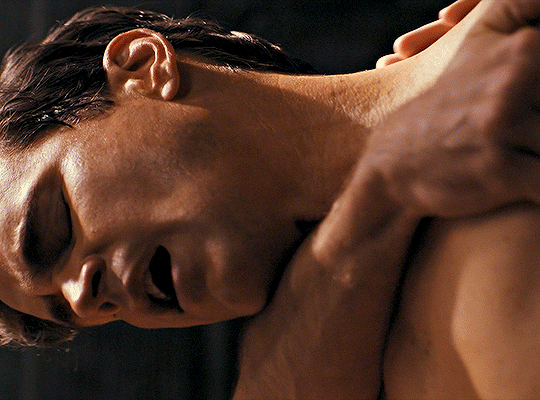

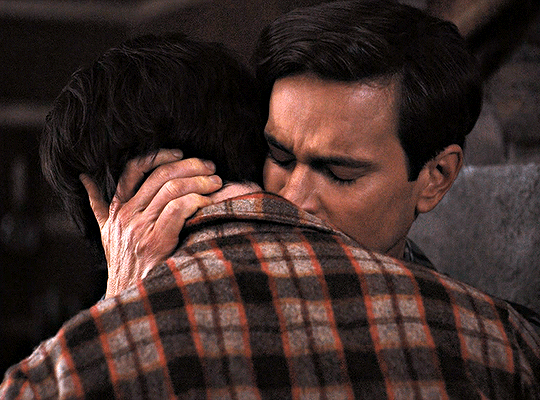
the way Hawkins "I just want to hold you tonight. If you'll let me" Fuller, from the very start, craved emotional intimacy... sex was simply the only acceptable way in for him. instead he spent his entire life burying that basic need, denying what he really wanted (until it was too late).
#jonny bailey always with the mic-drop insights#fellow travelers#fellowtravelersedit#hawk x tim#ft meta
183 notes
·
View notes
Text
The Importance of Banter: Varric Tethras
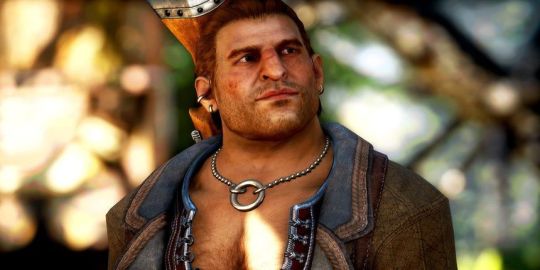
So one of the more interesting takes I've gotten on my breakdowns of Dragon Age characters is the argument that Varric in terms of character development is one of the lesser characters in the game.
He stays the same, doesn't change much from beginning to end, and while enjoyable, his inclusion doesn't add nearly as much as some of the other characters in the game, and relies way too much on the goodwill from da2 to do most of the legwork for his inclusion in the game.
Now this isn't an argument without merit, I might agree a lot with this take... If it wasn't for the inclusion of one Dragon Age's staples, and one of the aspects that Inquisition arguably does better than ether ADO or DA2.
Character Banter.
Character Banter is extremely important because it gives us an insight into how characters think, how they interact, and showcases the more subtle elements that aren't always on display in the game itself.
Compared to the rest of the Characters, Varric is a bit different in that because he was a companion in the previous game, we can see how he's changed since the previous game.
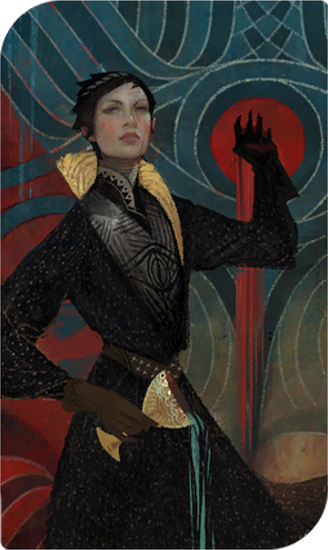
Cassandra Pentaghast
So it's not an exaggeration to say that Cassandra and Varric has what is easily the most dynamic relationahip between any of the companions, having far and away the most interactions together out of party(And thats not even including the fact that all of DA2 is technically them talking to each other.
And this is reflected in their banter as well, where the two of them go back and forth like a married couple.
The thing that most be understood about Cassandra and Varric's banter though, is the fact that Varric is way, way smarter than Cassandra, who isn't dumb, but is not a genius by any stretch, which is reflected in the Dwarf's tendency to run rings around her all the time.
Cassandra: Have you heard from any of your Kirkwall associates Varric?
Varric: You're asking me? So you don't read my letters?
Cassandra: You're no longer my prisoner, much as you like to act like it.
Varric: Yet I still get all the suspicion.
Cassandra: I am not without sympathy, especially given recent events.
Varric: Why, Seeker, I would never accuse you of having sympathy! By the way I tend to refer to my "associates" as "friends". Maybe you're not familiar with the concept.
Cassandra: (sigh)
---
Varric: You know, Seeker, for someone with your tact and charisma you assembled a... pretty good little Inquisition. I'm giving you the benefit of the doubt and assuming you didn't drag them all here by force.
Cassandra: How kind of you.
Varric: I mean, you never know, you could have kidnapped Ruffles and she'd be too polite to say anything.
Cassandra: Leliana recruited Josephine. They're... friends.
Varric: So there's a rational explanation after all. Just when I thought you had layers.
---
Varric: It makes sense that Leliana did the recruiting when the Inquisition started. Not everyone can be intimidated into signing up after all.
Cassandra: I recruited Commander Cullen.
Varric: Lucky him.
Cassandra: He has made no complaints about my manners.
Varric: His last boss was a raving lunatic who turned into a statue. That's not a high bar.
All of these three bits of banter is from early in their shared chain, and illustrates their dynamic very, very well. Varric reads Cassandra like an open book, and is able to completely take control over a situation just by playing the role of the ass who is just sniping at her because he feels like it, when what he's actually doing is maneuvering the conversation so it can end on him having the last words by playing on the things Cassandra knows she cannot refute without lying.
That takes a lot of sponanous wit and an ability to think on the spot, something cassandra does not possess, but Varric has in plenty.
Of course this dynamic is only at the start as they have plenty more as the story develops. One innparticular is their relationship regarding Varric's liturature, which is one of the more entertaining side quests in the game, but it does tell us more about them in the followup banter.
Varric: Seriously? Swords and Shields? How did you find that serial? Scrape it off the bottom of a barrel in Dust Town?
Cassandra: It was research! I thought I might learn more about the Champion.
Varric: I did write a book about the Champion. You might remember it. Had your knife stuck through it last I saw.
Cassandra: I already read that one. Twice.
Here we learn how much Cassandra actually loves to read Varric's work, but more importantly we get something we rarely see in Varric. Him talking about his own failures.
Varric likes to pretend he's this amazing writer who always produce masterpieces, as he himself says to Bianca, as if he'd write about his own failures and mistakes...
And yet there is swords and shields, a book that Varric has deemed an abyssmal failure. A joke, a mediocre piece of trash not worth the paper it was printed on... And yet it has it's fans. This work that varric despises still managed to find an audience, and despite how much satisfaction he had smugly giving it to Cassandra, that still grinds his gears.
People shouldn't like his bad work. It should be forgotten in favor of his masterpieces. A very dwarven way of thinking.
Varric: I can't believe you picked the absolute worst of my books to read. Why not Hard in Hightown?
Cassandra: I have enough mysteries and investigations of my own.
Varric: What? You don't want to solve more in your spare time?
Cassandra: Then you killed my favorite character in Chapter 3, so I threw the book across the room.
Varric: Ah, a critic. Say no more.
In this one, we get Varric both genuinely questioning Cassandra, as he seems to have assumed she actually does like investigating mysteries(she does not), but also tries to nudge her over to read High in Hightown instead.
Cassandra: Varric, how could you let the Knight-Captain be framed for murder?
Varric: Well, I did spent three entire chapters setting it up.
Cassandra: But she didn't deserve it! You'd already put her through more than enough!
Varric: Look, Seeker, if you love a character, you give them pain, ruin their lives, make them suffer. Maybe even throw in a heroic death.
Cassandra: That makes no sense!
Varric: You care enough to argue. If she had a nice afternoon and took a nap, you'd stop reading.
I could deconstruct this, but basically it's just a bit of meta commentary on what makes a good story. Not only will it not be the last, but it's not even the most blatant. After all, this one could apply to other people besides Hawke.
Cassandra: What made you write about Hawke? All your other books are complete fiction.
Varric: Someone had to set the record straight about the Champion.
Cassandra: Yet your book is still full of lies.
Varric: But true ones. That's important.
Varric loves stories... But he understands what stories are at their heart. The difference between a Recounting, and a Tale. That's what history is after all, the Tales everyone passed down.
And what good tale doesn't have a bit of exaggerated bullshit?
Cassandra: Why is the second Hard in Hightown so completely different from the first?
Varric: (sigh) Because I didn't write it. Shit, did you pay actual coin for that book? One of these days, I'm going to find the duster who wrote that garbage and introduce him to my editor.
Cassandra: By "editor," do you mean your crossbow?
Varric: No, my actual editor. Best in the business. She runs half the Coterie in Kirkwall. Stickler for grammar. She once killed a man over a semicolon. I'd never print anything without her.
This one is more meta commentary, but it does have a bit more meat to it. Varric's whole spiel about his editor being super powerful in the Coterie could be the truth, it could be complete bullshit. Or it could be something in between.
That's not the important part. The important part is that he wants Cassandra to guess, to assume, to speculate, because that is far more powerful than just laying it all out could ever be.
Cole: She has to reach the other side of the hill.
Cassandra: Who does?
Cole: The Knight-Captain. But she's injured.
Varric: (sigh) Good job, Kid.
Cassandra: Is she alright? Is that how the book ends?
Varric: Not anymore.
Cassandra: Cole, what happens to her?
Cole: I don't know. The hill went away.
So here we see that Varric is one of THOSE authors. You know the kind, the ones who will rewrite an entire storyline because the big twists was leaked ahead of time.
It's not that important in the grand scheme of things, but it's interesting how through the game we see a very consistent picture of how Varric likes to write. He's a gardner variety writer, but unlike GRRM he's not the kind thst sticks to what he had in mind and sets up if the big twist is learned before it's finished.
As for His banter with Cassandra related to Hawke, it's entertaining, but not exactly that enlightening. Except for one.
If you chose in DA2 to save carver or Bethany by making them grey wardens, you get this bit when Cassandra Questions him about them.
Varric: Aveline took him off somewhere when the Calling started going nuts, but he'll tag along. He always does.
Varric: Aveline took her off somewhere when the Calling started going nuts, but she'll try to keep Hawke out of trouble.
Cassandra misses the obvious, but you probably didn't.
Varric knew about the calling from the start. Oh he didn't know the details, and he didn't know why... But he knew there was something up with the calling from the very start, and probably figured out this was the key reason from day one.
And he didn't share it. At all.
That speaks volumes of where his true loyalties lies, and it's something a lot of people miss.
Cassandra is right. Varric's heart will never truly belong to the Inquisition so long as Hawke and his Kirkwall friends exists outside of it.
There is also a turning point in their conversations, starting around the point where Varric's personal quest with Bianca happened.
Cassandra: Am I to understand your Bianca is married?
Varric: Oh, have we reached the stage where we gossip about each other's love lives?
Varric: Did you hear that, boss? Don't worry, I'll tell you whatever she says.
Cassandra: Forget I mentioned anything. It was a simple question, Varric.
Varric: There was nothing simple about it.
Varric actually blatantly questions wheter they've reached the point where they are now talking about each others love with each other. The truth is though, they actually have.
Varric: You brought up Bianca, Seeker. Does that mean I can ask about your conquests?
Cassandra: I would rather you didn't.
Varric: No tantalizing secrets to divulge?
Cassandra: None.
(If the Inquisitor is in a relationship with Cassandra)
Varric: So no one within, say, a five foot radius has caught your eye?
Inquisitor: Really? No one at all?
Cassandra: This... is not a discussion I want to have here.
Varric: (laughs) Are you blushing, Seeker? Maker, the world really is coming to an end.
Or
Inquisitor: Perhaps Cassandra—and her conquest—would rather not discuss this in public.
Varric: Spoilsport.
Or
Varric: Nothing? You do know he's standing right there...
Cassandra: I... have no conquests.
Varric: How about dalliances? Liaisons? Illicit affairs?
Cassandra: No.
Sera: Enough poking, Varric.
Varric: Is it, Buttercup? Is it?
It a rather humorous affair, but it does show that Varric at this point is comfortable prodding Cassandra's love life, figuring out how far he can push.
Which speaks for itself at how close these two have gotten at this point.
Cassandra: Very well, Varric. If you wish to know about men I have known, I will tell you.
Varric: Look, Seeker. I was only...
Cassandra: You are right. I pried first, and fair is fair. Years ago, I knew a young mage named Regalyan. He was dashing, unlike any man I'd met. He died at the Conclave.
Varric: Oh.
Cassandra: What we had was fleeting. And years had passed. Still, it saddens me to think he's gone.
Varric: I'm sorry.
Nothing to add here, just that Varric sorta gets sad when he realizes that was friendly prodding touched a very bitter and sad point from Cassandra's pain.
For which he apologizes.
Varric: Look, Seeker, I didn't mean to make you talk about your mage friend.
Cassandra: I know. I was not trying to make you speak of Bianca. If I was, you would know. I would yell, books would be stabbed.
Varric: (Chuckles.) I'll keep that in mind.
Also as the game reaches the end section, Varric and Cassandra begin to really banter in a much more friendly way.
Cassandra: I still don't understand how drakes take that hand.
Varric: ...Hmm. Maybe we should start you on Shepherd's Six.
Cassandra: Isn't that a children's game?
Varric: Yeah.
When trying to teach Cassandra card games at this point in the story, Varric has the perfect set up for a punchline like he did in the early game, but he doesn't use it, because he isn't mocking cassandra here, he's genuinely trying to teach her how to play cards.
And so he suggest starting her off with something simple, like a card game for children, cause he understands thats where she has to start at her level.
There are plenty more, but most of it is just well written, engaging or funny back and forths. But before moving on, i wanna highlight two of them.
Varric: Did you really think the Conclave had a chance of making peace, Seeker?
Cassandra: You do not?
Varric: What was the Divine's plan? Bring everyone together and hope really hard that they would all get along?
Cassandra: Most Holy did not confide her plan to me. Perhaps she thought they were tired of death and conflict.
Varric: Oh, when is that ever been true? For Templars or mages.
Cassandra: I will not mock a dead woman, Varric. She did what she could, and that is more than most.
This conversation is very important for one simple reason. It showcases how much Varric has changed since DA2. Varric used to be one of the big believers in compromise in that game. He didn't come out and say it out right, because in that game the Templar far and away were the more evil faction, and so there was way more chances for Varric to stick up for mages, but Varric really, REALLY didn't want the mages and Templars to go to war.
He had so many friends in both factions, friends he knew would die if it ever did come to true blows.
I would say that varric was probably the best example of what neutrality in such a situation should have been. Someone who is neutral because he understood thst fundamentally, both sides even at their worst, were people. Not demons, not monsters, but human beings or elves. But unlike many others who clamor for neutrality, Varric wasn't stuck up his own ass about it.
If he saw one side go over the ljne, regardless of which it was, he would not just stand by wheter it was power hungry necromantic blood mages, or Templars like Ser Alrik.
But here, he mocks the very idea of neutrality. He has completely given up on it, and he's accepted that the only solution here, is for one side or the other will have to decisively crush the opposition.
Of course he doesnt come out and say it like that, but that's the message to take away here. So long as there is a templar or mage on the field, this war will continue. He doesn't like that fact, but he has accepted it.
Cassandra: I hear reconstruction is progressing well in Kirkwall.
Varric: I know things are bad there.
Cassandra: I wasn't trying to...
Varric: You weren't trying to remind me how bad is it in Kirkwall? So you decided to talk about it?
Cassandra: About its recovery!
Varric: What you're talking about are the buildings, and even that will take years. People don't recover so easily.
Kirkwall, that is to say, the Kirkwall Varric was born in, grew up in, and spent the happiest years of his life(When he was running there with Hawke), is dead and gone, and never coming back.
He is never getting it back.
Which will be very important for the next companion's banter.
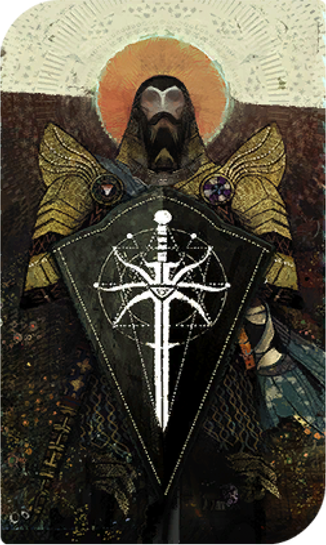
Blackwall
Blackwall is different than the rest of the crew in that he's utterly reliant on the Banter to have any sort of presence. He has no charisma in the actual game, but he does showcase a much more entertaining character in banter.
In regards to Varric though, his mian purpose is to showcase aspects of Varric we don't often see.
One of the most important comes very, very early into their relationship.
Blackwall: I once met a dwarf who made the best home-brewed ale.
Varric: I once met a Grey Warden who got possessed by a spirit and then blew up a Chantry and killed a hundred people. What makes people think you want to hear what others of "your kind" have done, anyway?
This is a moment that is:
1. Very uncharacteristic of Varric, who usually loves talking about other people if he gets any excuse to do so, and will be demonstrated in a very similar moment in his banter with the Iron Bull, only with a different reaction.
2. It's here to showcase Varric's hatred for Anders. Other than Sebastian, Varric misses pretty much the entire DA2 cast, his true best friends... Except for Anders.
Varric LOATHES Anders for his actions, for kickstarting the Mage Templar War and getting lots of his friends killed, but also for destroying his home and making his own worst fear come true.
Varric's biggest fear as shown in the fade is becoming his parents... And that's exactly what he has become in DAI. The depressed exile from a home city that he can never return to, and if he does, it won't be the same life they miss so dearly. Varric misses Kirkwall. He misses it's people, the Hanged man, and always thinking back on the glory days of his life.
And he misses Hawke.
All lost to him and never coming back, all thanks to Anders. Varric can never return back to that time, that place, that era, that friend group that was the highpoint of Varric's life, because the city of Champion Hawke and Varric the sidekick is as dead and gone as his parents.
The hanged man will never be the same, Hawke will never be the revered Hero they were after act 2, and every single one of the countless friends that Varric misses will not come back.
And so he hates Anders with a level of hatred he reserves for very, very few people.
The rest of Varric's starting relationship with Blackwall is about him trying to figure out what makes him tick, innitially pegging him as another Sebastian. Boring, safe, droll.
He also has more banter where he shows how depressed he actually is about Kirkwall.
Blackwall: I've been to Kirkwall. The Hanged Man, actually, probably been twenty years now. It was a dive if I remember correctly.
Varric: It's the dive. Filled with the best and worst people in the world.
Blackwall: Yes, I heard it was a haunt of yours.
Varric: Haunt? It was home.
He finally clicks with Blackwall, as they get into a shared passion nobody else in the party has. Jousting. The sport consistent of knocking people of horses with pointy sticks.
As a Free Marcher Varric has grown up with the Grand Tourney as a focal point of his identity, and loves the sport, so he and Blackwall bonds and argues over the sport, with the most notable part being their disagreements over who is the better jousting knight, where he also gives his own cents in the form of a meta commentary between who is the better protagonist, the Hero of Ferelden or Hawke.
Blackwall: You can't really think Reeve Asa is a better knight than Honorine Chastain. Her record's flawless. Four hundred jousts, never unseated. No one's ever come close to it.
Varric: Oh, she's easily the most skilled. That's a fact. It's just "scrappy" is better than "flawless." I like heroes who try their damnedest, even if they fail a lot. It's easy to be valiant when you always win and everything goes your way. There's nothing great in that.
The rather unsubtle meta message here, is comparing the protagonists of the first games.
The warden is the stronger, more skilled and more competent protagonist who ultimately always triumphed, changed the world, and became heralded far and wide as the greatest hero of her age.
Meanwhile Hawke is the scrappy underdog hero who always gets back on their feet regardless of how hard they fall, and never actually suceeds in anything. Hawke is a failure Hero who couldn't save their mother, their city, at least one of their siblings, maybe two, Ketojan, couldn't prevent the Qunari attack, and constantly failed to save the day through DA2.
Now i don't really agree with this rather simplistic reading of the Warden, but it's a good scene, because it shows that Varric is more than capable of overlooking all the work, effort and time it takes to produce a "perfect" result, as well as show that Varric has a very hard preference for underdogs, and the stories they produce.
Which leads into his reaction when Blackwall confesses his sins.
Varric: Maybe I've been too hard on you.
Blackwall: Oh, so you don't think I'm dreadful now.
Varric: Actually, I thought you were boring before. Completely different. We're all dreadful. Every one of us, fundamentally flawed in a hundred different ways. That's why we're here, isn't it? Take all the risks, so the good people stay home where it's safe. With the whole "Blackwall" thing, you told a story so compelling even you started to believe it.
Blackwall: That's much nicer than saying "You're a dirty liar.", I'll take it.
Varric: A story-teller's got to believe his own story, or no one will.
Here we can gleam a sad fact. Varric very pointedly notes "we're all dreadfull", as Us, as in, him included.
Varric doesn't really consider himself a good person anymore, if he ever did.
It's not like the Varric of Yesteryear considered hinself a saint or some knight in shining armor, but there was a sense that he was happy with himself during that game, in a way he is not in DAI.
Something has changed, and that something is guilt over unleashing the red lyrium on the world, and probably guilt over killing his own friends.
It's not really focused on as much as it should be, but Varric had plenty of friends amongst both the mages and Templars... Which meant that when Anders blew up the chantry, regardless of which side you picked, Varric was forced to kill people who genuinely mattered to him.
Hence why he's so quick to forgive Blackwall for his lies.
For the most part this generally manifests itself in regards to Red Lyrium, which he blames himself for bringing into the world. I would argue that the more subtle parts you get to see in Banter though, is far, far more interesting and better told than the stuff in the main quest.
Because despite his flaws he "takes all the risks, so the good people won't have to.", just like Varric and Hawke.
This is in large amount what Varric in Inquisition is for the most part all about. Guilt, self loathing, and wanting to be a better person.
He just masks it with his usual wit, charm and charisma.
Kinda like Blackwall, only he doesn't really have much charisma or wit to hide behind. Hence why he is so accepting of, and willing to give him another chance without question.
On a final note before we move on from Blackwall, we also get to see varric try to play matchmaker between Blackwall and Josephine which is cute, but not exactly surprising, or give us further insight into Varric's character.
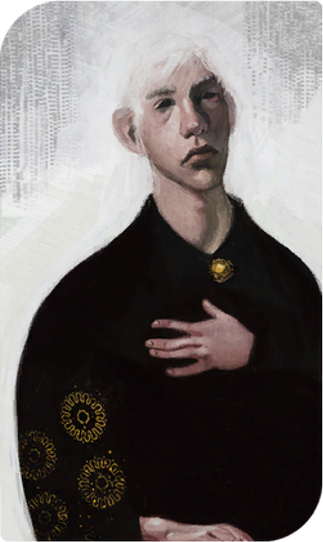
Cole
Now, I'm not going to cover Cole here, not because the banter isn't interesting, or we don't learn anything, but that's all from the way we learn about the world, or Cole himself.
Varric's side of these banters can be summed up in one sentence, for pretty much every single banter.
Varric is Cole's dad.
Rinse, repeat.
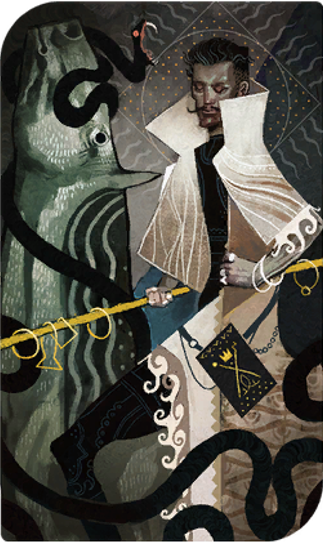
Dorian
Similarily, I will not be covering the banter with dorian, not because it's bad, far from it, it's some of the most entertaining in the game, but it doesn't exactly add much beyond the fact that both Varric and Dorian love to gamble, and share witty banter.
Also nugs has some creepy ass feet. The stuff of nightmares.
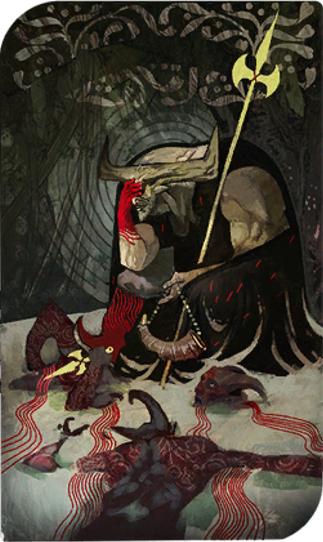
The Iron Bull
Far more to be dissected, can be found in Varric's banter with the Iron Bull.
There is so much to learn from this banter, from Spy work to how the Antaam is viewed by the other Qunari and so on, but we'll focus on the stuff relating to varric, as he and bull talk about a lot of things.
Varric: You're not the first Ben-Hassrath I've run across. Hawke and I went on a caper with one named Tallis.
Iron Bull: You don't say.
Varric: She caused us no end of trouble. You wouldn't know her by any chance?
Iron Bull: Hey, one time I ran into this dwarf on the road. Short, grouchy. You think you might know him?
Varric: I'm in the Merchant Guild. Ten royals says I not only know him—he owes me money.
Iron Bull: Oh. Well... no. I don't know Tallis. Sorry.
In stark contrast to his talk with Iron bull, when not involving Anders or other people he hates, Varric loves to talk about people. To the point that in his comeback to Iron Bull, there is an invitation here for Bull to specify who this random dwarf was, because chances are, he actually might know him, and could elaborate on the guy.
Varric: How could you possibly be a spy?
Iron Bull: Well, it's a pretty easy job. I do some fighting, and drinking, and then once in a while I tell Par Vollen about it.
Varric: Heh. Where's the sneaking, the plotting, the subtle machinations?
Iron Bull: If you do that, everyone knows you're a spy. Drinking, fighting, writing notes, that's all it really takes.
Varric: Shit. You're either the worst qunari ever, or the best. I can't decide.
He also showcases great frustration with the way Iron Bull pokes holes in his Bond like spy writing, in favor of the mundane realities of Cloak and Dagger stuff.
Because for all that he prides himself on tall tales, varric does like his writing to somewhat be plausible. Its why he gets pissy at the inquisitor when he tells him how stupid so many parts of DA2 were writing wise, cause Varric wrote it how it happened, and while embelishing it, it was mostly true.
And if his spy writing isn't realistic enough that it might plausibly happen... Then it's not as good as it could be.
Iron Bull: By the way, Varric, you write some nice fight scenes.
Varric: Well, thank you. I'm surprised you think so. They're not exactly realistic.
Iron Bull: I figured that out when the good guy did a backflip while wearing a chain mail shirt.
Varric: And that didn't bother you?
Iron Bull: Back in Seheron, I fell on a guy who tried to stab me in the gut. I felt the blade chip as it went through my gut and hit my back ribs. But I was alive, and on top. I sawed through the armor on the rebel's neck, back and forth, until it went red. I don't need a book to remind me that the world is full of horrible crap.
Varric: Impossible swashbuckling it is.
Meanwhile, this bit is surprisingly layered.
First off, there is Bull's retelling and describing the way he dealt with the Vint while bing impaled as "realistic". If this was not a world with magical healing such as potions or poultices he'd had died from this incident, due to infection if nothing else. That's meant as a bit of meta irony.
But the actual meat of this, is that Varric is just letting Bull rant.
The whole "Backflip while wearing chainmail armor" is something Hawke can literarily do in DA2, Provided you are a rogue Hawke and has high enough stats. If so, when hit by a trap, Hawke will simply backflip out of the way, even if wearing chainmail armor.
It is the kind of shit that for a long was normal for Varric, and he writes it into his fight scenes(Which he has a self dig at calling them not realistic, despite having seen shit like that for himself all the time).
But he doesnt say any of that.
Instead he just lets Bull rant, get it out there how shitty he really feels, because varric knows when to talk, and when to listen, and here is a time to listen.
Varric: So, Bull. You and Dorian?
Iron Bull: Mm-hmm.
Varric: "Two worlds tearing them apart, Tevinter and Qunari, with only love to keep them together."
Dorian: I don't see how this is even remotely your business, Varric.
Iron Bull: Could you make it sound angrier? "Love" is a bit soft.
Dorian: Please stop helping the dwarf.
Varric: How about passion?
Iron Bull: Yes, that's better. Love is all starlight and gentle blushes. Passion leaves your fingers sore from clawing the sheets.
Dorian: You could at least have had the courtesy to use the bedposts.
Iron Bull: Hey, don't top from the bottom.
Varric: Passion it is, then.
Also, i wanna highlight his banter with bull, if he and dorian hook up, and if both are with him in the party. It's really the only bit of Dorian varric banter with real character meat to it, as it puts Dorian's rarely seen tsundere side on full display, and why he makes such a good match with the easy going, yet equally passionate iron bull.
Iron Bull: Hey, Varric, I was reading your stuff... Where do your bad guys come from?
Varric: Well, some of them come from Tevinter and some are Ben-Hassrath spies... but I like the stories where the villain was the man beside you the whole time. The best villains don't see themselves as evil. They're fighting for a good cause, willing to get their hands dirty.
Iron Bull: All right, that's really deep and all, but I meant where do the bad guys come from literally? The way you write it, it's like they just fall from the sky and land on top on the hero.
Varric: I like to leave some things to the reader's imagination.
Also, final bit i'll cover of these two here. It's both a meta hit of writing in that it's supposed to be about solas, but can also apply to Iron bull, and is a self depreciating dig on the single worst gameplay mechanic from DA2.
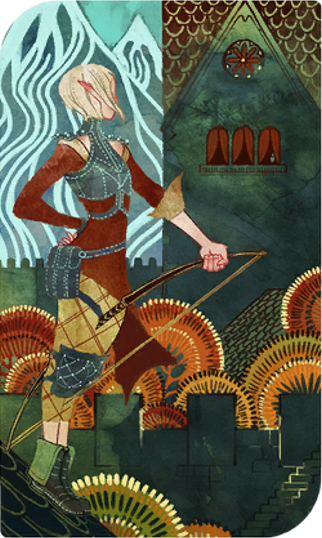
Sera
So, as with Cole and Dorian, im not covering this sequence of banter as it doesn't really reveal much about Varric as a character. Its generally just Sera trying her usual bullshit, and Varric taking the piss out of her, much to her frustration.
Im not exactly a big fan of Sera, and even here, where most of their dialogue is about Varric basicaly running rings around her, don't really makes me smile.
There is one bit of banter though, that i do want to highlight.
Sera: (sing-song) La la la la la, Sentinals are shits.
Varric: Like it or not, Buttercup, that’s where you come from.
Sera: Says the undwarfiest dwarf ever!
Varric: Fair enough. Paragons can be shits too.
So, this one i feel is extremely important, for the reason that it goes to showcase that 1. Sera doesn't understand Varric in the slightest, and 2. Really goes to showcase Sera's complete and total lack of self awareness, and just how out of touch she is, raiding other people's homes, and calling them shits for defending themselves.
But that second one i'll save for Sera's banter review.
For this one, I want to highlight how Varric, just like Dorian understands and more importantly loves the Culture he originates from. He knows how shitty dwarven culture can be, and will never avoid taking the piss out of it for all it's flaws, but he also admires it. He admires their ability to create marvels, their grit and determination that has seen them take on the Darkspawn for a hundred years and still stand, and the individuals that stood up and above the rest to serve as legends, just like Hawke and the Inquisitor.
There is a reason his hangouts in both games are decorated full of very traditional dwarven furniture. Because he wants to live in a home that looks dwarven.
Because the past is important.
It's a bit of wisdom he tries, and fails to impart to Sera, that you simply trying to pretend your roots don't exists never works. And he's right. Even though Sera never admits wrong on her own part, she fully admits she burnt out on this spiteful hatred in Tresspasser.

Solas
Solas and Varric's banter though, is far, far more interesting.
Both of them are tricksters, both value the past greatly in their own way, both understands the power of a story, both of them lie to the Inquisitor, and both would rather remain the side character than step up to take the spotlight.
And yet they are different. Opposites almost.
One of Varric's defining feature as a person is that he cares about all his friends and how those friendships transcends the chains of status, having become friends with dwarves, Qunari, kossiths, humans, elves, templars, mages, seekers, antivans, fereldens, kirkwallers, orlesians, tevinters, anders, revains, avvar, and so on.
Solas single defining feature is how he sees everyone he does not knows except for his own, very small list of what he considers countrymen, as not things, and is willing to destroy the world for them to prosper.
Varric stays out of the spotlight cause he likes being the power behind the throne. Solas does it because as the Herald's Judas, he doesn't want anyone to question the many, many questions about him further than they have to.
Varric lives in the present, but respects the past. Solas in the past, and is terrified of the present.
Which leads to some of the most interesting banter in the game.
Solas: By the end of Hard in Hightown, almost every character is revealed as a spy or a traitor.
Varric: Wait, you read my book?
Solas: It was in the Inquisition library. Everyone but Donnen turned out to be in disguise. Is that common?
Varric: Are we still talking about books or are you asking if everyone I know is a secret agent?
Solas: Are there many tricksters in dwarven literature?
Varric: A handful, but they're the exception. Mostly they're just honoring the ancestors. It's very dull stuff. Human literature? Now there's where you'll find the tricky, clever, really deceptive types.
Solas: Curious.
Varric: Not really. Dwarves write how they want things to be. Humans write to figure out how things are.
Solas questions Varric about the to him, alien Dwarven liturature, trying to figure out what the new, "lesser" dwarves might write about when no longer part of a hivemind.
Varric gives it to him straight, but there is a deeper bit of character here.
Varric is able to explain this to Solas, because as a man who understands Dwarven culture, strengths, flaws, and weaknesses, and how it ticks, as well as undoubtedly having read a lot of dwarven literature, Varric is able to point out all it's shortcomings, or more accurately the way Human and Dwarven literature trends differentiate due to different cultural values.
Varric: You really spend most of your time in the Fade?
Solas: As much as is possible. The Fade contains a wealth of knowledge for those who know where to look.
Varric: Sure, but I don't know how you dream, let alone wander around in there.
Varric: Especially when the shit that comes out of the Fade generally seems pretty cranky.
Solas: So are humans, but we continue to interact with them... when we must.
Here Varric pries a bit into a topic he(If you took him with you in night terrors) only has experienced once before for himself, from someone who knows more about the fade and the veil than anyone.
Solas ends it on a much darker note than Varric assumes though, as what he means is, we have to tolerate them "for now."
Solas: Is it true that the entire dwarven economy relies upon lyrium?
Varric: Mostly. We've got the nug market cornered as well.
Solas: And the dwarves of Orzammar have never studied lyrium?
Varric: If they have, they certainly haven't shared anything up here. Why?
Solas: It is the source of all magic, save that which mages bring themselves.
Solas: Dwarves alone have the ability to mine it safely. I wondered if they had sought to learn more.
Varric: The folks back in Orzammar don't care much about anything but tradition.
So here we have Varric flat out bullshit Solas in several ways. He knows way more about lyrium than most, having studied red lyrium himself, and yet he does not give that information to Soals, the way he does with the Herald, showing that deep down, Varric trusts you far more than Solas, if not as much as Hawke.
He also knows that both surface and underground Dwarves have deeper knowledge of lyrium than any human, being it's the source of all the enchantments and magic, and that while they might not know it's origins, they understand how it works, and how to use it, transport it, store it, and so on.
If there is one thing Orzammar is good at, and not stuck in tradition, it's exploiting Lyrium to the hilt.
And yet he bullshits Solas about it completely. Because this is an early banter, the likely reason is simply that he does not trust him.
Which given his other important lies is not surprising.
And solas later recognizes this.
Solas: I find the fall of the dwarven lands confusing.
Varric: What's so confusing about endless darkspawn?
Solas: A great deal, although that is a different matter. Dwarves control the flow of lyrium. They could tighten their grip on it.
Varric: It's hard to get the attention of the humans when the darkspawn aren't up here messing with their stuff.
Solas: You're active in the Carta. You know your people could tug the purse strings. You could claim sovereign land on the surface, or demand help restoring the dwarven kingdom, but you don't.
Varric: You're not saying anything I haven't said myself, Chuckles. Orzammar is what it is
Solas Attacks Varric's arguments from adifferent angle here, without directly calling him a liar from the banter before, as he points out just how much power Orzammar has through it's economic might, how even if they know how to use Lyrium so effectively, they haven't been wielding that might to effecrively hammer out an anti Darkspawn coalition to crush the darkspawn in their own dens and wipe them out from the source.
Realistically, the dwarves are rhe only ones who could see it done, and yet they havent. Because before Bhelen, there was never a king willing to upend the entire system to get results.
Varric doesn't actually give his direct thoughts in this bit of banter, but it goes into future ones. Before that though, im gonna quickly cover another bit of banter.
Solas: Do you ever miss life beneath the earth? The call of the Stone?
Varric: Nah. Whatever the Stone - capital S - is, it was gone by the time my parents had me.
Solas: But... do you miss it?
Varric: How could I miss what I never had?
Varric: But say I did have that sense, that connection to the Stone. What would it cost me?
Varric: Would I lose my friends up here? Would I stop telling stories?
Varric: I like who I am. If I want to hear songs, I'll go to the tavern.
Solas: You are wiser than most.
Solas worships the past, to such a degree that he thinks being part of a hivemind under the titans, must have been better for the Dwarves, because of what it allowed them to accomplish by magic, and more importantly that it's what they used to be.
And what they used to be, must be better than what they are now, because the past is better.
Meanwhile Varric is content with the present. He never had stone sense, so why worry about it? Why dream of it, why become his parents? That would be absolutely awful, so why not embrace what you have now.
Though Solas doesn't know it, his backhanded praise here is actually even moreso than he knows.
Its backhanded by intention, because he acknowledges that varric is wiser than those who would wail about their lost glory... But as we'll see in the following banter, he regards all Dwarves, regardless of wheter they are like Varric, as lessers and fools. So varric is better... But he is still a fool.
Meanwhile, on Varric's part, it's even more backhanded than Solas intends because Varric is doing exactly what he's saying he isn't here.
Dreaming of glory days when all was simplier and he was a happier man. He's not dreaming of stone sense itself, but the sentiment is the same.
And he knows it. That's one of the saddest things about Varric in DAI. He became his parents, his worst fear, but he's very much aware of that fact.
Solas: Is there at least a movement to reunite Orzammar and Kal-Sharok?
Varric: What is it with you, Chuckles? Why do you care so much about the dwarves?
Solas: Once, in the Fade, I saw the memory of a man who lived alone on an island. Most of his tribe had fallen to beasts or disease. His wife had died in childbirth. He was the only one left. He could have struck out on his own to find a new land, new people. But he stayed. He spent every day catching fish in a little boat, every night drinking fermented fruit juice and watching the stars.
Varric: I can think of worse lives.
Solas: How can you be happy surrendering, knowing it will all end with you? How can you not fight?
Varric: I suppose it depends on the quality of the fermented fruit juice.
Solas: So it seems.
---
Solas:: I am sorry to have bothered you with my questions about your people Varric. I see so much of this world in dreams. Humans, my own people, even qunari. Dwarves alone were lost to me, save scattered fragments of memory where some spirit cared to watch. Now I know why I see so little.
Varric: And why is that?
Solas:: Dwarves are the severed arm of a once mighty hero, lying in a pool of blood. Undirected. Whatever skill of arms it had, gone forever. Although it might twitch to give the appearance of life, it will never dream.
Varric: I'd avoid mentioning that to any Carta, Chuckles. They might not take it the right way.
---
Varric: What's with you and the doom stuff? Are you always this cheery or is the hole in the sky getting to you?
Solas: I've no idea what you mean.
Varric: All the "fallen empire" crap you go on about. What's so great about empires anyway?
Varric: So we lost the Deep Roads, and Orzammar is too proud to ask for help. So what? We're not Orzammar and we're not our empire.
Varric: There are tens of thousands of us living up here in the sunlight now, and it's not that bad.
Varric: Life goes on. It's just different than it used to be.
Solas: And you have no concept of what that difference cost you.
Varric: I know what it didn't cost me. I'm still here, even after all those thaigs fell.
---
Solas: You truly are content to sit in the sun, never wondering what you could've been, never fighting back.
Varric: Ha, you've got it all wrong, Chuckles. This is fighting back.
Solas: How does passively accepting your fate constitute a fight?
Varric: In that story of yours—-the fisherman watching the stars, dying alone. You thought he gave up, right?
Solas: Yes.
Varric: But he went on living. He lost everyone, but he still got up every morning. He made a life, even if it was alone.
Varric: That's the world. Everything you build, it tears down. Everything you've got, it takes. And it's gone forever.
Varric: The only choices you get are to lie down and die or keep going. He kept going. That's as close to beating the world as anyone gets.
Solas: Well said. Perhaps I was mistaken
This entire banter line is about Varric and Solas.
On solas part it's about his very well spoken and articulated racist opinions on the modern dwarves compared to those who came before and trying to rack his brian around them not going to the lengths he himself would have gone to save their race.
Also the fact they are no longer part of the Titan hivemind. He's really stuck on that for reasons we don't really fully understand.
However, far, far more importantly this is about Varric's entire storyline in DAI.
Varric talks about Orzammar, about the loss of the deep roads, and yet they are all still there, still fighting, still marching on, rather than laying down and dying.
That is the true strength of the Dwarven race.
The ability to keep going even after losing everything. The original dwarves lost the titans and their magic. They marched on.
The dwarven empire lost the deep roads, and all but two thaigs. They marched on.
The surface dwarves lost their caste the last remains of their magic, and their status in dwarven society. They marched on.
Varric lost kirkwall. He lost his entire friend group that was the people who he loved more than any other group of people he has ever know. He lost his home that he grew up in and loved. He lost his parents and he lost Barthrand, the only remaining family he had, and who despite it all deeply, deeply loved. He lost Bianca, a teenage infatuation he never was able to get over.
And he lost Hawke. Either to Anders kickstsrting the war, or to the fade.
He lost everything he loved.
And yet He. Marched. On.
Varric's story in DAI is an understated one, one that isn't really given story focus, but unlike all the rest of the attempts at telling a more subtle story with the companions, this one actually worked.
Varric's story, is about his march onwards.
He lost everything due to Anders actions, and yet here he is. Marching forward through life. He hasn't laid down and died. He's still here. He's still fighting.
He still has hope.
And so he marches on through the twilight of his life, and keeps going, even if he loses Hawke forever... He keeps going, and he makes it through his depression, and grief to make a new life for himself in Kirkwall.
A new Kirkwall, but Kirkwall nonetheless.
Solas: That crossbow is remarkable, Varric. I am surprised the dwarves have not made more of them.
Varric: The woman who made Bianca would rather that not happen. Wars are bloody enough as it is.
Varric: A crossbow that fires this far and this quickly with so little training? Every battle would be a massacre.
Solas: Indeed. I am surprised, not disappointed.
Here we get a lot of insight into Varric... But also a moment of great moral ambiguity.
Everything Varric says here is true... But it would also mean his people finally, finally being able to destroy the darkspawn for good and all. Such a tech advantage would allow them to wipe the blighted Creatures from existence with ease.
Varric is more than brilliant enough to understand this... But he chooses not to think about it, or wheter it's a good course of actions, because he is shackled to Bianca even now, even still.
Bianca wants this crossbow not to be on the market, so he doesn't put it on the market, regardless of good or bad.
Varric: Hey Chuckles, do you ever play Wicked Grace?
Solas: I'm not much of a gambler anymore.
Varric: You don't have to play for real coin, that's just for keeping score.
Solas: What do you play for?
Varric: Conversation mostly. That way I win no matter how the cards fall.
This is a followup to Varric's original introductionary short story from way back in the day.
From that one we learn that Varric doesn't actually drink anything served at the Hanged man, he just orders a wine glass or beer mug, because he knows people get nervous if you don't drink in a bar, so he crafts an illusion to aid him in his rogue life.
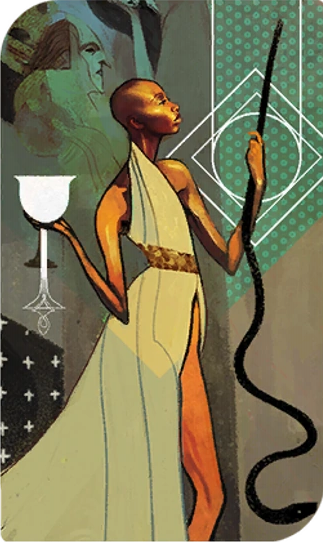
Vivienne
So like a number of these I'm not gonna cover them in full, as while good, and well written, and paints a very clear picture of Vivienne, they're not exactly deep character pieces for Varrix... But I do wanna cover a few.
Vivienne: Am I to understand, Varric, that you knew the apostate who destroyed Kirkwall's chantry?
Varric: Unfortunately, yes.
Vivienne: What could he possibly have hoped to accomplish with such madness?
Varric: Exactly what he got: a whole lot of innocent people killing each other.
Vivienne: I take it he's no longer on your Wintersend gift list.
Varric: Depends. Does a flaming sack of bronto dung count as a gift?
Vivienne: Only if you tie it with a silk ribbon, my dear.
More Varric hating Anders, and laying all the blame of the Mage Templar Wars and ruining his life on him.
Vivienne: Tell me, Varric, who is the protagonist of this serial?
Varric: You know, we're so far into spoiler territory right now, I think I better stop talking.
Vivienne: Come now, darling. You can tell me.
Varric: Not on your life, Iron Lady. The best way to ensure a book's nevered finish is to tell someone your entire plot.
More Varric showcasing he cannot stand spoilers coming out, and it destroys his entire ability to write.
Vivienne: You know, Varric darling, I read your Hard in Hightown.
Varric: You did? Seriously?
Vivienne: Most of the Imperial Court did. It was in fashion a few winters ago.
Varric: Just how much gold is my publisher stealing from me?
One detail i really like about Varric, is that he tries to create this image of himself as always bring in control and all that... And then he has moments like this where his regular ass publisher swindles him for a shit ton of money.
Vivienne: How many chapters will this book be, Varric dear?
Varric: Well, the first one will come out in twelve chapters.
Vivienne: The first one?
Varric: I've read enough Orlesian fictions to know you never tell a story there in fewer than three complete books. They think you're just warming up after one.
Vivienne: And what happens to the scheming duchess in the first book?
Varric: Are you asking for spoilers, Madame De Fer?
Vivienne: Hints, darling. Not spoilers.
More Varric showcasing he understands other cultures and how they write stories.
#dragon age inquisition#dragon age#dragon age 2#varric tethras#hawke#solas#cole#the iron bull#cassandra pentaghast#dorian#vivienne de fer#blackwall#thom rainier#sera#the inquisitor#the herald of andraste#meta#banter
330 notes
·
View notes
Text
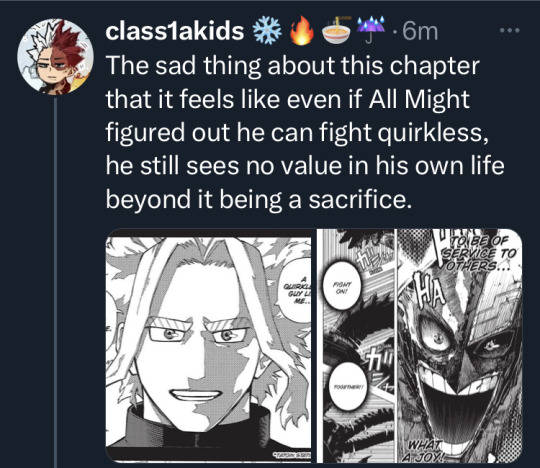

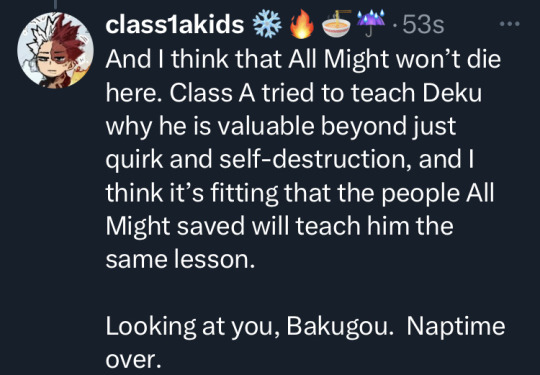
#bnha 398#all might#bakugou katsuki#bnha manga spoilers#too lazy to write a meta#but yes#this fight feels like how Endeavor had to still be saved by his family#how hawks still had to be saved by Tokoyami#it feels like All Might still needs to internalise the whole living thing
354 notes
·
View notes
Text
I'm seeing a lot of people (not just one or two) express disappointment about the Twice and Hawks lack of confrontation. I want to just say, in all seriousness, there's something being ignored here and it has a lot to do with people not understanding Twice and why, even if it would do a lot for Keigo's character development, it wouldn't be good for what and who Twice was and meant in the narrative.
Even aside from the clones essentially not being Twice, I think people are not realizing the war arc has been the villains' Bad End in so many ways. That there was a lot of dramatic irony in how they ended up and that included Twice.
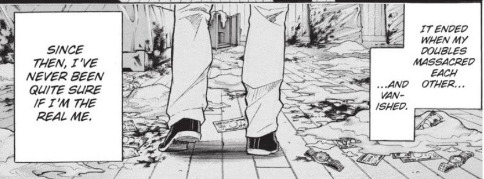
In a sense, throughout the war arc, none of this has been Jin, and that's good because even the idea of there being any Twice sentience among would remind me of this:

The idea of Jin not being an original would have sent him into a mental breakdown.
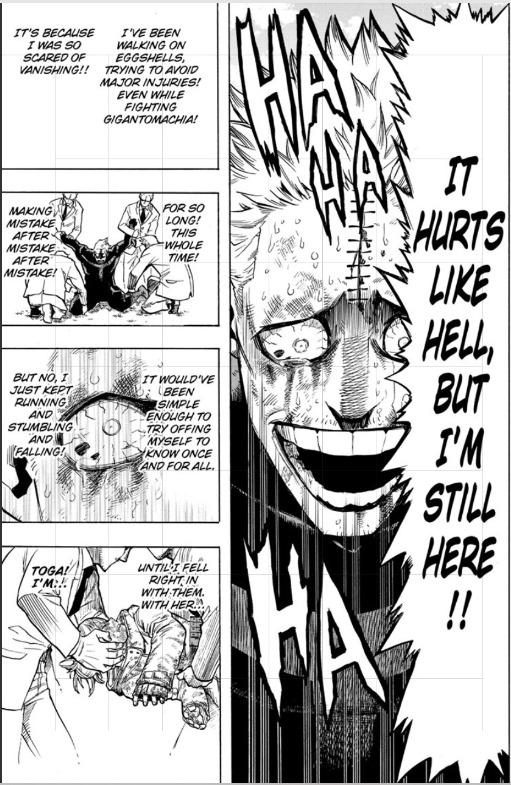
So, just the idea of Twice being used like this - with no original, no concrete way to himself, there's a horror aspect to this. In Toga's grief (righteous and needed as it is because SOMEONE needs to mourn Jin), she has also created Jin's Greatest Nightmare.
Any closure from this wouldn't have been "real". Or it would have been just Keigo reconciling with what he's done, which is still on its way, but would be very one-sided. There's no Twice there to really tell Keigo off.
I understand where everyone is coming from, but there's a lop-sided interest in Keigo facing consequences (which he has and will continue to), but little understanding or care that this isn't what Jin would have wanted. Jin wanted to be himself, and trusted, and surrounded by the people he loved and lived for. Jin feared not being the real original clone. Would have there been a real good narrative reason to use what would have been Jin's greatest fear to propel Keigo to self-actualization? Jin and Hawks represent the first attempt at saving a villain, a league member, in this manga, and Hawks failed. And he needs to come to terms with that by himself.
#bnha#bnha spoilers#bnha 394#bnha twice#hawks#jin bubaigawara#takami keigo#meta#im just a little exhausted from people not getting the horror on twice's part in all this#and I genuinely think its coming from not valuing Jin as a character on his whole not just his connection to the league or his killing
272 notes
·
View notes
Text
You know what I’m going to bite the bullet and write a fic and maybe a few head cannons. But I would like to write stuff for you guys (haha to the two followers I have) so send in asks if you would like. 🙏🏽😫💗 would rather it not be smut though😰
#bnha shoto#bnha fanfiction#midoriya izuku#villian!deku#villain deku x reader#bnha bakugou#bnha x reader#bnha#bnha x you#class 1-a x reader#mha#bakugo thoughts#bakugou katuski x reader#deku x y/n#domain.bnha#hawks meta#bnha smut#bnha dabi#bnha oc#bnha bakugo katsuki#my hero academia#boku no hero academia#my hero acedamia#mha season 6#bnha s6#mha x reader#mha oc#mha fanfiction#bnha midoriya
44 notes
·
View notes
Text
I'm probably going to do a terrible job of articulating myself here but every time I think about the worldbuilding in Hatoful Boyfriend, I think about the implications of having the birds simply have adopted the structure and policies of human society and go insane.
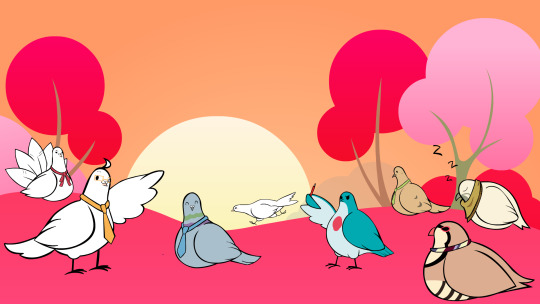
It's clearly originally just for the ridiculousness of it all for the players, but AGH it explains so much regarding the extremely rampant classism/racism/speciesism and how apparently normalized it is. It also, to me, adds a bit of moral nuance to the Dove - Hawk Party conflict.
(Long post under the cut. I'm so sorry I just kept going.)
First off, I'm obsessed with the concept of the birds becoming sapient and simply... taking over a society that was not structured for them. It leads to difficulties in universe! Bird wings are not made for doing tasks that human hands can do naturally - there's a couple instances where the characters ask for Hiyoko's assistance or express envy since she can just do the task more easily than they can. The birds are outright disadvantaged in certain areas of life, and yet, the society is in such turmoil due to the newness of it all that there still aren't really any workarounds for stuff like this.
Not that there haven't been any suggested solutions, such as the Labor 9 series, put forward initially by the Dove Party. Yeah, you know, that one throwaway line about how the party that up until this point have been the "good guys" wanted to take still semi-conscious human brains and make robotic slaves out of them Cyberman-style? What the hell. And what gets me is that Shuu was able to find the initial proposal, which he really only made tweaks to, which means that the project was at least close to being finished on the conceptual/planning/design phase before somebody went "hey this is a little fucked up actually".
The Dove Party wants peaceful coexistence with the humans, while the Hawk Party wants to eliminate humanity entirely. But we don't really go into how these two lines of thought evolved. I believe I have a suggestion for at least one part of the puzzle though.
Of all the birds in Hatoful, who enjoys the most privileges and the highest status? Fantails, it would seem. A breed of pigeon that is popular as a pet, considered beautiful and sought after, and achieve high accolades in shows and competitions - for clarity's sake, fantails were valuable in human society, and this status appears to have transferred when birds became sapient and took over. Conversely, which birds are ranked lower and often blocked from entering certain higher class places? Rock doves, who, in human society, are given an unfairly bad reputation, and considered anything from unclean and dirty, to nuisances, to pests. Again, this status transferred over when the birds took over.
So, while we don't know too many of the birds who make up the agents of the Dove and Hawk Party, let's take a look at who we do know of.
Fantails (Yuuya, Dove Party) are considered valuable over other doves and pigeons for being specially bred for their striking tail feathers
Cockatiels (Leone, Dove Party) are some of the most popular and beloved companion birds, kept as pets and considered very friendly
Rock doves (Ryuuji, Hawk Party) are considered unclean pests who receive a bad reputation, and are generally not treated with respect or appreciation <;- notable thing to mention here is that Ryuuji actually does like humans - I think he was only Hawk affiliated for the grant money and research facilities, which... fair enough man.
Chukar partridges (Shuu/Isa, Hawk Party) are game birds, specifically bred and released to be killed and eaten, and considered a delicacy
...do you... see what's going on here?
(I haven't mentioned Tohri as he's a special case. Give me a minute and I'll get to him!)
The birds we see in the Dove Party are those birds that were already viewed in a more favourable light by humans, a favourability that transferred over to their new society. Of course they are more likely to advocate for coexistence! They have less to lose, overall. And the Labor 9 series, and how that could've ever been suggested in the first place, suddenly makes a lot of sense. For many of these birds, society the way it exists now benefits them. Some of these high ranking Dove Party folks may be less about actual peace and justice (like Yuuya or Leone) and more about maintaining the current order of things - humans coexisting under their control, while they get to maintain their status... which is itself a product of human invention.
The birds we see in the Hawk Party, by contrast, are looked down on or hunted. Historically, even before bird sapience, they did not have a harmonious relation with humans - and it's likely this status carried over to their new society also, with many of these birds being more likely to have been disenfranchised. Their goal of elimination is therefore reactionary towards perceived threat. After all, the people who suffer when things go wrong aren't the ones at the top - it's all the people who sit at the bottom of the social rung; the vulnerable members of society who do not enjoy the same advantages as others.
Of course, the Hawk Party has built itself up into such a powerful group that they may have lost touch with this starting foundation - the only thing that remains is likely that reactionary fear. After all, people caught up in the actual conflict - Nageki, Hitori, Ryouta, and Hiyoko - see this kind of horrible bloodshed firsthand (firstwing?) and just want it to stop.
Again, it's not usually the people in these political factions who are the ones caught up in their conflict. It's the individuals who lack power or influence.
But that's just the political groups themselves. On an individual level, it's kind of interesting to look at and theorize where along the spectrum our core cast falls based on their species/breed.
Ryouta (rock dove) is actually rather indifferent towards humanity as a whole - he just likes Hiyoko. However, his witnessing of the Heartful House tragedy led him to abhor violence and unnecessary loss of life, and I'd imagine his mother's later illness solidified this. Ryouta doesn't seem overly interested in political struggles or the broader implications of a lot of things - he's actually a rather self-oriented character when it comes down to it (this is not a judgment, nor a bad thing! I love my boy!). Ryouta just doesn't want to lose people, really. A conflict would mean more loss, and rock doves seem to have to struggle enough as is.
Hiyoko (human) is the daughter of two diplomats, but interestingly, we don't get to see much of her political views on things - perhaps because even if she expressed them, it wouldn't really matter - she's not herself a diplomat, and humans are the lowest of the low - her going to a fancy school doesn't really change that. Social-wise, except with her friends, she is tolerated, not accepted. Yet, it's safe to say that Hiyoko strongly disapproves of people who flaunt their status - she's quick to not take crap from Sakuya, to get angry on behalf of Ryouta and herself over the gull clerk's assholery, and also to defend Miru and Kaku as living beings worthy of respect. Interestingly though, she also uses Okosan's status as a fantail to get Ryouta to let go of him and let him do whatever he wants so... it's kind of unclear what her firm beliefs are. Perhaps, as a human, she still values fantails more highly. I don't know honestly. Implicit bias?
Sakuya, Yuuya and Okosan (fantail pigeons) may share the same breed, but their experiences are highly different. Sakuya is largely separate from the human-bird conflict, as he is unlikely to be directly affected by it. As such, a lot of his story and development has to do with actually learning and un-learning about the world outside of the limitations of his "father's" classist views, which he simply mimics without understanding the larger implications. Yuuya and Okosan, on the other hand, may be fantails, but are also looked down on and often treated as inferior - Yuuya for being a "half-breed" and for his reputation, and Okosan for being closer to feral than a lot of other doves. Interestingly, these two show more interest and respect for the individual than Sakuya does, who often makes sweeping generalizations based on status - which makes sense to a degree, as they've been on the receiving end of this kind of treatment, whereas Sakuya hasn't. Okosan believes that each person has their own "wonderful names" (read: identity outside of breed or status), while Yuuya is a genuine fighter for justice who is able to get to the heart of people, especially in Holiday Star. However, even though they have experienced classism, they still have certain privileges with regards to species/race - take Okosan's shock when Hiyoko and Ryouta are barred entry from his favourite store. None of them are quite as out of place in everyday society as some of the other birds here, and it's notable that "diverse" St. Pigeonations still apparently has a significant fantail student population.
Shuu (chukar partridge) is really interesting, as he doesn't particularly care for the politics of the Hawk Party, and yet his role as a killer/hunter of both his fellow birds and humans is an interesting reversal of the chukar being a game bird. Shuu also has a disability (his semi-paralyzed right side) which hinders him in bird society even more than most. His extreme, yet coldly logical solution to kill all humans to stop the fighting between them, could be as much his rationality, as his joy in the sadistic, as a reactionary survivalism (remember he was caught up in a human terrorist attack as a child - while overall he considered this beneficial to him, he also did lose much of his colour vision and the use of his right side, so it did leave him weakened). Shuu attains control by "flipping the script" as it were.
Tohri (golden pheasant) starts out in the Hawk Party, but much like his colleagues, doesn't seem to care much for their politics. Golden pheasants are game birds whose eggs can be eaten, but are more often bred and kept for their plumage - they're not prey, but they're not exactly pets either. All this puts Tohri in this interesting position of being somewhat in the middle of this conflict, and indeed he goes on to be a part of (found?) the Crow Party - an opportunistic group that seeks to benefit from the overall conflict. Golden pheasants are birds intended to be admired for their beauty and intelligence more than anything else, benefitting in some ways from humans without a strong connection or a reliance, and Tohri's opportunism fits nicely with that. (As an aside, our sole crow character, Albert, is also something of an opportunist, being an assassin on the fringes of society.)
Hitori and Kazuaki (button quails) are somewhat interesting. It would be both expected and understandable if Hitori held hatred for humanity after the Heartful House incident, or even before then, considering they were all war orphans. Instead, he doesn't seem to harbour any particular ill-will - he seems totally fine around Hiyoko, and her being a human has nothing to do with his reticence with letting Nageki hang out with her in the shrine universe. Kazuaki, too, doesn't seem to mind Hiyoko being human and isn't afraid of her any more than he is anyone else. While quails are game birds, with both meat and eggs being eaten, button quails are too tiny for that and are mostly kept as pets - they are considered cute, silly, and entertaining, though a bit too jumpy to be outright companion birds. The quails don't seem to experience too much in the way of speciesism (except arguably with the whole mistaken identity of Kazuaki's corpse... there may be a bit of an "all quails look the same" thing going on perhaps). At the very least, they are able to occupy teaching positions at a renowned school as respected intellectuals, and did go to university. Still, it's kind of a known thing that you don't put button quails with bigger, more dominant birds, since larger birds will often pick on them or even outright try to kill them simply because they're small and shy - this may, in hindsight, explain some of Kazuaki's demeanour.
Nageki (mourning dove) and Anghel (luzon bleeding heart dove) are the two who are uncommon bird species in Japan. Nageki is another war orphan, who would be forgiven for harbouring resentment for humanity, but instead is appalled at the violence and made a huge sacrifice to get it to stop. It's kind of unclear how Nageki fits into this society, as mourning doves are not prey or pets - they're wild birds. They live on the outside of the human world, and while Nageki exists within current bird society, he likely doesn't have a designated status within it. Nageki is unfortunately also alienated from much of the action due to his illness and later his untimely death - this is why a lot of Nageki's thoughts are somewhat from an observer's perspective, with his most emotional moments being derived from his rare direct experiences - specifically the Heartful House tragedy and the human killings he was forced into, which solidified a really firm stance of not wanting anyone to suffer like that. Anghel is another outsider, this time genuinely a foreigner, as opposed to Nageki. Again, Luzons are wild birds, not prey or pets, and so it's a bit unclear what his status is. This might explain why Hiyoko repeats Sakuya's remarks towards him without apparently realizing they're actually insults - Anghel is removed enough from the conflict she is familiar with that it seems she doesn't quite... get it. Again, Anghel's role is as this strange kind of omniscient observer, whose perspective is closer to the player's than to the rest of the cast. He definitely frowns on the Hawk Party's overall goal - the Demon Spores are evil to him, and his main objective is to stop them from spreading, as they would cause damage to both birds and humans. I attribute his morals to his mother having raised him right lol. The lack of a clear status for both of them may be why they appear to take the stance of judgment based on individual actions, but are not heavily involved in the conflict itself - while humans tend to like mourning doves and luzons, there isn't much interaction that goes on between them. Nageki and Anghel are simply less embroiled in bird society's human-derived status conflict, which makes them both outsiders and observers.
As a bonus note, Azami, Rabu and Kenzaburou are all species of birds that can be kept as pets (java sparrow, budgie, parakeet), which may account for some of their friendliness towards Hiyoko, and Kenzaburou's willingness to hire her. Kenzaburou is even a bit old-fashioned it seems - he sleeps in a cage, which implies his ancestors were probably pet birds themselves. It's likely he, in particular, has more positive views on humans.
...Please tell me I'm not the only one who spent ages thinking about the implications and workings of a fictional post-apocalyptic bird society. Also I hope this made sense I kind of went off the rails here.
#storyrambles#anyways this was supposed to be a quick write up. yet here I am three hours later. does this even read properly anymore. help.#the one thing i'm a little unclear on here is how the ichijou family fits into all this. ichijou mino the headmaster was a nicobar pigeon#i find it likely mino was hawk affiliated if we're going with the trend here (nicobars are heavily exploited for food/#gizzard stones/zoos/illegal pet trade) and also note that he signed off on the human representative directive#but i want to know how shuu fits into that as he was formerly ichijou utsuro. who has the ichijou name? why different species?#are they prominent benefactors of the hawks? interesting to think on#also i was thinking about the gulls - they seem to be fairly high class but gulls definitely do not have a good reputation with humans lmao#however gulls get to do whatever they want a lot of the time because they are loud. and like to bully others (including humans)#i hereby propose they gained power by doing much the same once birds gained sapience hjfhbdf#hatoful boyfriend#hatoful spoilers#holiday star#hatoful meta
151 notes
·
View notes
Text
Anti-Endhawks takes to debunk

"Endeavor is 46, and Hawks is 23; why do you ship them?"
That's all on personal preference, tbh. It's cool if you find the age gap to be uncomfortable. It's important to point out that both characters met when Hawks was a pro-hero (meaning he was already an adult when they first started working together as a duo). Endeavor himself did not know of Hawks when he was younger. If Endeavor knew Hawks as a child and the relationship was formed due to that, then I would also have an issue with the ship itself and understand this saying for argument purposes.
There is already a canon age gap between Gentle and La Brava, and no one talks about how the age gap is bothersome for them, with Gentle being in his early 30s and La Brava in her early 20s. I think from what I've been seeing that people just don't like Endeavor as a character (which is fair if that's the case. You don't have to love his character or anything). Still, it would be good if some antis were honest about using this take as a reason to shun the ship in general.
"Endeavor is still married to Rei; therefore, he is still connected to his family that they had."
Yes, Endeavor is a part of the Todoroki storyline since his perspective alongside Touya and Shoto's is very important for readers to pay attention to. His relationship with Rei Horikoshi has shown that it quickly changed despite their relationship starting out as wholesome and healthy in the early stages. We see very fast that the love that Rei and Endeavor once had turned sour once they began having children, and Endeavor tried to push his goal of having that perfect child with the ideal quirk. Now, whether the two reconcile and come back together is anyone's guess; I'm assuming that Horikoshi won't have Rei and Endeavor get back together, and they will most likely separate due to everything that has happened in their relationship and family in general.
This reasoning, out of all the anti-endhawk ones, is probably the most reasonable if I'm being honest, since the Todorokis are shown still having some connection back to each other. We are still determining how the aftermath of it all will play out.
For story purposes, he is very much connected to Rei since they both are responsible for saving Touya. But it's good to note that when it comes to Endhawk's relationship, they don't display the typical power imbalance that most people would expect from out-of-age gap ships. In fact, when it comes to their overall dynamic, both characters respect each other as equals and have this bickering/bantering dynamic, especially during their early interactions; they both care for one another, as seen in the panels below.
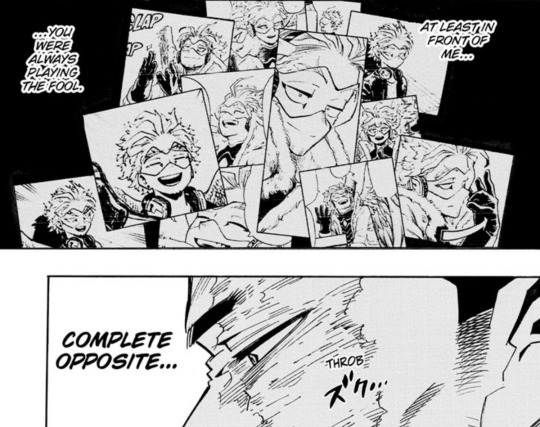
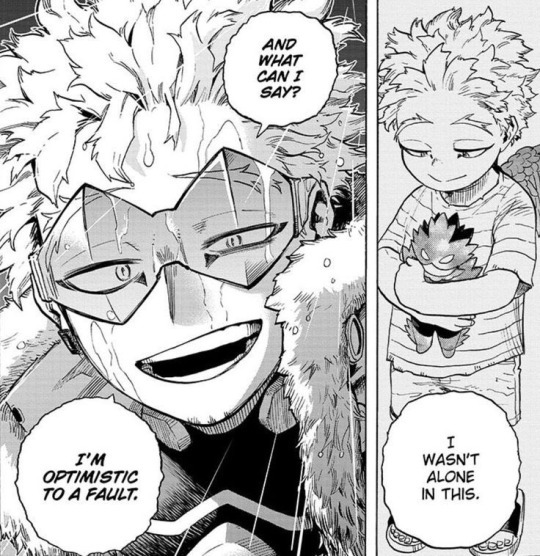
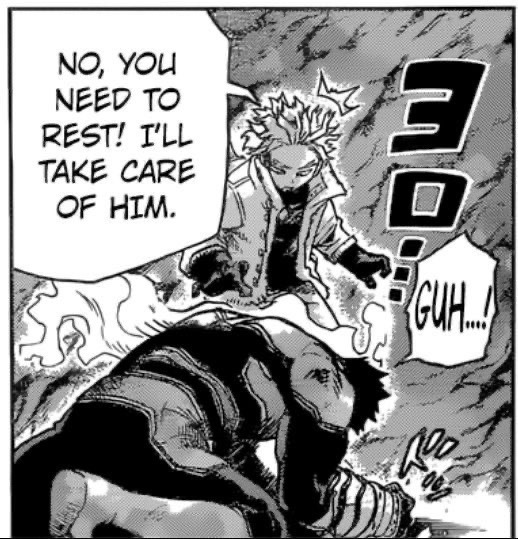
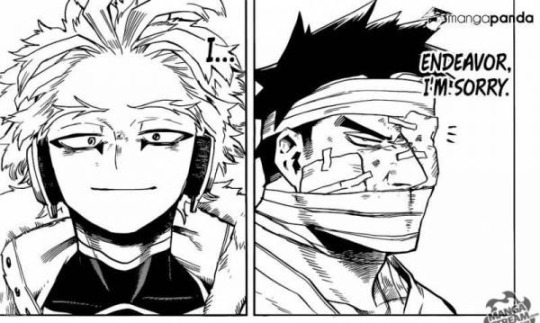
"Hawks would hate Endeavor if he knew his past."
This take has been a common argument circling around the fandom before Dabi broadcasts his reveal to the world. I have to say, I was curious what Hawk's thoughts would have been if he found out Endeavor's past, but after he explained that despite the wrongs Endeavor has done in his life, he still would support him and do his best to help him out whenever he needed him. To me, it showed how much he trusted him; he views Endeavor as the person who is trying to atone for everything he has done to those around him rather than the person he once was; and this trust that the two of them have extends into the final arc as well.
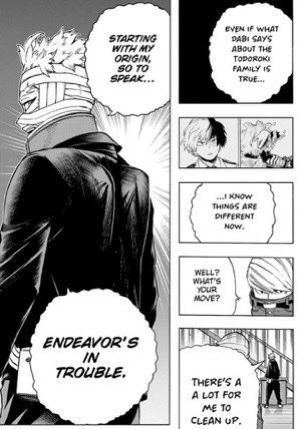
If there are other takes I should probably tackle; I'll make a separate thread for those. But I am also working on a Bakudeku version of this as well (so look forward to that one 😊❤️)
#bnha#my hero academia#mha#boku no hero academia#boku no hero#endhawks#endho#enji x keigo#enji todoroki#keigo takami#endeavor x hawks#scftizuku meta#endeavor#hawks
97 notes
·
View notes
Text
At the end of the day you can use "Varric is an unreliable narrator" to overwrite literally any part of DA2 that you don't like. Like you can say, "Oh of COURSE Varric isn't actually against mage freedom! He just said that he objected to Hawke freeing the mages because Cassandra was interrogating him." And sure, I can't prove to you that he isn't lying about that. I can't prove to you that Varric isn't lying about anything. I can't prove to you that the entirety of Inquisition isn't also Varric making things up because he did also write a book about that and we hear Cassandra reading it in the end credits. At the end of the day if you want to you can basically wipe out Varric's entire character as presented to us and say, "Actually he was lying! He's really this."
But at a certain point you do also have to acknowledge that the frame narrative is a storytelling device that's meant to enhance the story, not like... erase it. Or at least I prefer to acknowledge that, because going too far the other way basically guts the story of all meaning. If Varric is a character we are meant to engage with on any level--and I think it's clear from his prominence in the franchise that he is!--then at least some of what we see him say and do needs to be able to meaningfully interpreted, even if we second-guess him, even if we can pick out half-truths here and there, even if we cross-check our interpretations against how he behaves in other parts of canon.
Like at least some of what we're given about Varric has to be meaningful to his character, or why even bother, I guess is what I'm saying.
#somewhat said i wasn't giving him enough credit in my meta post about how starry eyed he is about pro-templar hawke#that we can't take his objections to freeing the mages at face value#and i mean i guess you can say that but you can say that about literally anything he says in da2#face remains he's still starry-eyed about hawke no matter what#fact remains his approval follows hawke no matter what#and yes he's also friends with anders! don't mistake loyalty for agreement#it's a thing with a lot of these characters#see also aveline#anyway!#gwaren exports#i guess!#i'm not trying to be salty here but i just don't agree with the premise#dragon age stuff#blunders of thedas#please don't go digging and argue with anyone on my behalf btw#their comments were in the tags i assume they weren't looking for a fight#i just saw them and had feelings
90 notes
·
View notes
Text
listen I don't even know what I'm talking about anymore but on this playthrough of DA2 I found myself once more entranced and heartbroken to see hawke reenact their relationship with their mother with the entire cursed city of kirkwall. you can never do enough for leandra, and you can never do enough for kirkwall. leandra is proud of you, and kirkwall uplifts its champion, but no matter how hard you try for them you can't fix everything there that's broken, no one could, and even the fact that anyone would feel the burning responsibility to take that task on is a huge warning sign on its own. leandra will easily allow you to sacrifice yourself on the altar of the family's continued well-being again and again, even when she'll beg you to spare the twins from the same thing. it's such a sad, painfully realistic thing because I truly don't think leandra meant to fuck up her kids, and yet she primed her oldest for an abusive toxic codependent relationship with an entire ongoing dumpster fire of a city state better than she ever could have if she had meant to.
I think what leandra actually, deep down wants from you is something you can never ever give her and that is cruel to ask of anyone, but especially your kid -- to bring her back to a time when she was happy. to reclaim when you were all happy, when nothing was broken that couldn't be fixed, before malcolm died, before you had to leave behind bethany or carver's broken body on the ground. to get her childhood back from where she left it and found it all gone and in ruins when she returned. 'this is all your fault'. this is the tragedy of parenthood sometimes I think, that capacity to define a life: she said that once, in a moment of profound pain, and she probably wouldn't have said it under other circumstances and she apologizes later, but now hawke has to live with that forever. leandra can't bear her own emotions without letting them spill over onto someone else so she won't have to hold the discomfort of them anymore, and hawke is left to shoulder that burden and responsibility again and again, handed the impossible task of making it all okay again, somehow -- of stopping anything bad from ever happening again in the Nr 1 Bad Things Constantly Happening capital of thedas.
and then at the same time there's the mirror of how varric's whole family wants orzammar back (and to him orzammar is just a ghost he's seen in their eyes -- there's something in his voice when he says 'That stupid plate was the whole city of Orzammar to him' that gets me every time, how much he understands that he doesn't understand and how lonely that makes him among them, and on top of it all he's frustrated and ashamed and sad that he just doesn't get it and can't meet them on it -- like it's a betrayal that he actually belongs up here, when varric wants so badly to be loyal), just as the hawkes want happiness back. (I don't think it's Lothering in itself that longing is for, it's for being together. Lothering was just the place they stayed the longest.) they're all in exile, even as they try to make a new home out of that exile.
(varric and hawke's real 🤝 quality across all personalities, affinities and choices is 'parentified child' lmao. so much of varric's character makes perfect sense once you know he grew up supporting a mother who was an emotionally volatile alcoholic, honestly. between varric, the hawkes, isabela, seb if you have him and merrill's whole Situation with marethari I feel like DA2 covertly is to mommy issues what ME2 is to daddy issues fjsdjfa)
basically I think I'm trying to pick apart exactly why the fact that leandra is clearly proud of hawke and tells them so several times doesn't feel like it helps at all, almost feels more like a cage even though it's clearly meant well? and what I'm getting is that it's because my sense of what hawke actually needs, in general but especially from a parent, isn't admiration or approval but to be loved and supported and understood. I don't believe leandra ever quite understands them, and it scares her because it makes her think she maybe never even understood malcolm. (that's the subtext of a lot of what leandra will say about him in legacy, at least. he's slipping away from her as the years pass after his death and she fears she never really had him in the first place, if he had secrets like these.) she consistently treats her oldest more like a partner or peer than as her child, which considering hawke is always described as being very similar to their father… I mean I totally see how that could be easy to slip into for her after he died especially, but it doesn't make it any less fucked up or unfair.
the real leandra in legacy is. she is SO absurdly self-centered, if you really pay attention. I don't want to keep dunking on her because I don't think she's like this on purpose, but it boggles my mind. if you do the quest in act 1 she gets so upset and overwhelmed that the kids just sort of sit there like :( at the end, which adds to the trend that through the game you constantly see hawke comforting leandra, and you pretty much never see leandra comforting hawke, beyond some light vaguely encouraging comments in passing. if you do legacy in act 2 while she's still alive hawke comes to her, tentatively asking if malcolm ever spoke to her about any of it -- clearly requesting some sort of emotional support or help to make sense of it. she then expresses her side of it, but never once does she say anything to the effect of 'hey that was a lot to go through, are you okay after all that?'.
instead she essentially hands them the responsibility of having a good life, to repay what malcolm did for all of them. and in theory that's not the worst takeaway I suppose, malcolm probably would want them all to be happy, but in the moment it only feels like more expectation heaped upon you somehow? especially since you don't really get to express anything about how it made you feel before she goes to the 'ah no use complaining' zone (after SHE got to express her grief at feeling like she's losing more and more of that old life, and hawke barely got to say anything fhsfalkjfs). in general she really doesn't do much like. parenting, does she haha. there is so much love there in that relationship, and yet so little comfort. Oh, those days. All of us, in that simple place. Well, that's neither here nor there, is it. This life, we have to make the best of it. And thanks to you, and him, I will. Oh well, mum, I'm uh. I'm glad you feel better after that, at least. Nice to be of service.
it's varric's ghost-leandra who actually acknowledges what a burden hawke has taken on, that shows an understanding of why they're doing it, acknowledges the loss they've been through and also reassures them in their sense of belonging that still can't be taken from them, despite it all -- The best of him is still with you. The best of all of us. It's what makes you try so hard. You'll always have that. We'll always be family. (you can't take 'loved' away, huh.) you get a bit more of a reconciliation/reconnection between hawke and their dad's memory by being reminded he got like this too, you know (implicitly you're not alone). varric through leandra is the one who tells them what they probably would have wanted and needed to hear from a parent right then -- It's going to be alright. that's what Hawke, The Champion means to everyone else, and for once they get to be the one to hear it. except only in a kind dream that never really happened. I. it. hmmmmmm. crushing. that is crushing. but also so incredibly tender from varric's side, and so moving to me that he's seen all this stuff and so desperately wants to give them that comfort. anyway DA2 is about love in some of the realest and thus messiest and most human ways I've ever seen and it makes my brain go wild it's my favorite game of all time goodnight
#I don't even know what I'm saying anymore folks please just. accept this. it makes no sense/compels me though etc.#dragon age meta#dragon age#dragon age 2#hawke#leandra amell#honestly someone should do an analysis of the mother figures of DA2 because oh BOY something is up here#elthina and all her talk of the chantry as a 'gentle mother' very much included#as I believe terry pratchett once wrote:#That's Nature for you in a nutshell. Always dealing off the bottom of the pack. No wonder they called her a mother.
2K notes
·
View notes